
зеленый
.pdf
1d Match the adjectives in ex. 1.c with the best pair of nouns below.
1 |
_____ city/train |
3 |
_____ room/bottle |
5 |
_____ feet/wall |
2 |
_____ face/colour |
4 |
_____ person/life |
6 |
_____ lake/water |
2. Reading
2a What famous explorers do you know?
2b Read the interview with Michael Palin and put the questions 1-6 in the right place (a-f).
1 Which countries have your visited?
2 How many books have your written?
3 What have you learned from your different trips?
4 What’s the best place that you’ve visited?
5 When did you become a travel writer?
6 Have you eaten any unusual things?
Around the world with Palin
by Stuart McCarthy
Michael Palin has visited many countries and he has become one of our most popular travel writers. I asked him about his fascinating life. a)________________________________________________________________
When I was 42, in 1988. I made a TV series – Around the world in 80 days – and wrote a book about that trip, and so I started this great career.
b)_______________________________________________________________
I’ve written six travel books – one for each TV series.
c)______________________________________________________________
Perhaps you should ask which countries I haven’t visited! I’ve travelled from the North Pole to the South Pole, and across every continent. A very lucky man!
d)_______________________________________________________________
Oh, definitely. I’ve eaten insects and a snake. I ate that when I was in China, in 1985. It tasted like chicken.
e)_______________________________________________________________
Ah, my favourite place is in Peru – the river near Machu Picchu. It’s the most wonderful, magical place I’ve ever been to in all my travels.
f)_______________________________________________________________
The most important thing that I have learned is that people are warm, kind and fun all over the world, and that a smile really is universal.
2c Are this sentences true or false?
1 He wrote his first travel book after he made a TV travel series.
52

2 He has made six TV travel series.
3 He has never visited South America.
4 He ate insects in 1985.
5 His favourite place is in Africa.
6 He thinks there are friendly people everywhere.
2d Look at these sentences and answer the questions.
a)I made a TV series when I was 42.
b)I’ve travelled across every continent.
c)I’ve written six books.
d)I wrote a book in 1988.
1 Which sentences give the time when Michael Palin did something? 2 Which tense do we use when we give the time we did something?
3 Which tense can we use when we do not give the exact time we did something? 4 How do we form the present perfect and the past simple tense?
2e Complete this personal travel history with the correct verb form.
I 1)_______(visit) many different countries but I 2) ________ (not be) to South America and Africa – I hope to go there soon. I first 3) ________ (go) abroad in 1991. I went to France with my school and two years later I 4) ________ (visit) Spain – my favourite country. I also love Asia. I 5) ________ (work) in China and I 6) ________ (visit) Thailand and Japan. I 7) ________ (work) in China in 2003 – I 8) ________ (have) a wonderful time because it 9) ________ (be) so different from my country. Finally, last year I 10) ________ (study) at film school in New Zealand – that was great!
3. Speaking
3a Do you know what places are shown in the pictures A-F? Find the places’ names in the list below in ex. 3.b.
A 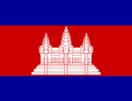 B
B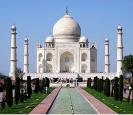 C
C 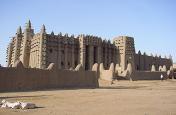
53
D 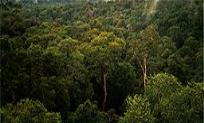 E
E  F
F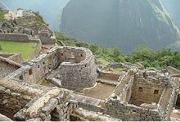
3b Work with a partner and match the places with the encyclopedia entries about them.
With your partner discuss the following:
have you ever been to any of them, or seen any of them?
what else do you know about them?
|
1 Heathrow Airport |
|
9 Mount Fuji |
|
|
|
2 the North Pole |
|
10 Uluru (Ayers Rock) |
|
|
|
3 the South Pole |
|
11 Easter Island |
|
|
|
4 Table Mountain |
|
12 the Grand Canyon |
|
|
|
5 the Coliseum |
|
13 Machu Picchu |
|
|
|
6 the Taj Mahal |
|
14 the Empire State Building |
|
|
|
7 the Great Wall of China |
|
15 the Amazon Forest |
|
|
|
8 Angkor Wat |
|
16 the Djenne Mosque |
|
|
|
|
|
|||
A a steep-sided gorge carved by the |
|
K a volcanic island in the Pacific, |
|||
Colorado River in the United States in |
|
discovered on Easter Sunday, 1722; |
|||
the state of Arizona |
|
noted for the remains of an aboriginal |
|||
|
|
|
|
culture, which includes gigantic stone |
|
|
|
|
|
figures. |
|
B a large isolated desert rock, |
|
L the largest mud brick building in the |
|||
sometimes described as the world's |
|
world and is considered by many |
|||
largest monolith, in the Northern |
|
architects to be the greatest |
|||
Territory of Australia: sacred to local |
|
achievement of the Sudano-Sahelian |
|||
Aboriginal people. Height: 330m. Base |
|
architectural style |
|||
circumference: 9 km |
|
|
|
||
C a moist broadleaf forest that covers |
|
M a ruined Incan city in the south of |
|||
most of the Amazon Basin of South |
|
Peru |
|||
America |
|
|
|
||
|
|
|
|||
D a 102-story landmark Art Deco |
|
N an extinct volcano in central Japan: |
|||
skyscraper in New York City at the |
|
the highest mountain in Japan, famous |
|||
intersection of Fifth Avenue and West |
|
for its symmetrical snow-capped cone. |
|||
34th Street |
|
Height: 3776 m. Also called: Fujiyama |
|||
54

E the southernmost point on the earth's |
O a large area of ruins of the former |
axis, at the latitude of 90°S |
Khmer Empire in Cambodia |
F a white marble mausoleum in central |
P a wall in China from Gansu to the |
India, in Agra: built (1632-43) by the |
Gulf of Liaodong, constructed in the |
emperor Shah Jahan in memory of his |
3rd century BC as a defence against the |
beloved wife, Mumtaz Mahal |
Mongols. Length: over 2400 km; |
|
height: 6 m; width: 6 m |
I the largest and busiest airport in the |
Q a mountain in South Africa, |
United Kingdom |
overlooking Cape Town and Table |
|
Bay: flat-topped and steep-sided. |
|
Height: 1087 m (3567 ft.) |
G the northernmost point on the earth's |
R an amphitheatre in Rome built about |
axis, at a latitude of 90°N |
75-80 A.D |
 3c Listen to a woman talking about one of the places. Which place is it? Track 12.
3c Listen to a woman talking about one of the places. Which place is it? Track 12.
 3d Listen again. What does she say about it? Make notes.
3d Listen again. What does she say about it? Make notes.
1 first view of it:
2 visits to it:
3 reasons for liking it:
3e Work with a partner to share your travelling experience.
Student A: Talk about your last holiday for about one minute.
Student B: Listen to your partner. Ask questions to get more information.
3f Choose six places from ex. 3.a that you would like to visit (you have to choose from at least three continents). Think of the reasons for visiting them. Then tell a partner about them.
4. Language skills
4a Work with a partner to discuss the following.
Do you prefer to go abroad for your holidays or stay in your own country?
What kinds of places do you like to visit on holiday?
If you could travel anywhere in the world for your holiday, where would you go? Why?
 4b You will hear four young people being interviewed on a radio holiday programme. As you listen, write down which statement ( a-e) each speaker (1-4) makes. There is one statement you do not need. Track 13.
4b You will hear four young people being interviewed on a radio holiday programme. As you listen, write down which statement ( a-e) each speaker (1-4) makes. There is one statement you do not need. Track 13.
a I’ve always enjoyed going to different places. ___
b I’ve always been afraid of flying. ___
55

c I always go on holiday with my parents. ___
d I don’t like spending too much money on a holiday. ___
e I like dancing and having a good time. ___
4c In pairs, find out from each other the following information about your summer holidays. Make a note of your partner’s answers.
favourite / usual holiday destination
usual means of travelling there
length of time spent there
activities to do there
holiday companions
type of food eaten
feelings about the holiday
4d Now find another partner and report what you first partner said. Use the verbs say and tell, and don’t forget to make all the other necessary changes, for example, to the tenses.
5. Listening
5a Discuss the questions with a partner.
What do you know about ‘ethical travel’?
Does ‘ethical travel’ mean:
a)behaving yourself while travelling
b)caring for the places (and people) you visit
c)taking a keen interest in the place’s history and culture?
 5b Listen to the conversation about ‘ethical travel’ and check if your guesses were right. Could you add some more main features of ‘ethical travel’? Track 14.
5b Listen to the conversation about ‘ethical travel’ and check if your guesses were right. Could you add some more main features of ‘ethical travel’? Track 14.
 5c Listen to the conversation once again and fill in the missing words or phrases from the box below (there are three phrases you don’t need).
5c Listen to the conversation once again and fill in the missing words or phrases from the box below (there are three phrases you don’t need).
A |
the effect |
F |
solve problems |
B |
tips |
G long plane journey |
|
C be more aware of |
H at their cost |
||
D |
causing problems |
I |
running water |
E |
‘package’ and ‘all inclusive’ |
J |
form of income |
1. Most of us have probably heard of ____________ holidays but when I asked Bush House, not many of us had heard of ‘ethical travel’.
56

2.Trisha was talking about _____________ that tourists can have on the people who live in the countries they visit.
3.We also heard how the local people usually have very poor ‘infrastructures’, for example, little access to transport, electricity and __________ .
4.We’ll be able to visit those countries in the future without _____________.
5.The governments of many developing countries encourage tourism as a valuable ___________ .
6.According to Trisha, knowing what’s going on could lead tourists helping to
___________ rather than adding to them.
7.Do you think that ___________ - giving extra money to low-paid workers – keeps their wages low?
5d With a partner, discuss the problem of ethical tourism and suggest some ways of traveling without causing problems to the local people.
6. Extra Activities: Planning a holiday
6a You and your partner have got $500 each and seven days holiday. Look at the holiday adverts below and decide where you want to go. You can go on more than one trip. Look at these phrases. Can you remember how to continue?
6b Look at these phrases and divide them into things a customer or a travel agent would probably say. See if you can finish the phrase with suitable words.
I’d like…
I prefer…
Yes. But this one is more… than
I’d rather…
I don’t mind…
It looks …
We could …
I’d like to book …
Certainly, when would you …?
I’m afraid that’s not available, but you could …
I was wondering if …?
Could you tell me …?
Can I pay by …?
6c Work with a different partner. Student A is a travel agent and Student B wants to book the holiday. Use the phrases in 6.b and the information in the adverts to help you.
6d Find another partner and tell them about the holiday you have chosen, and when you are going.
57
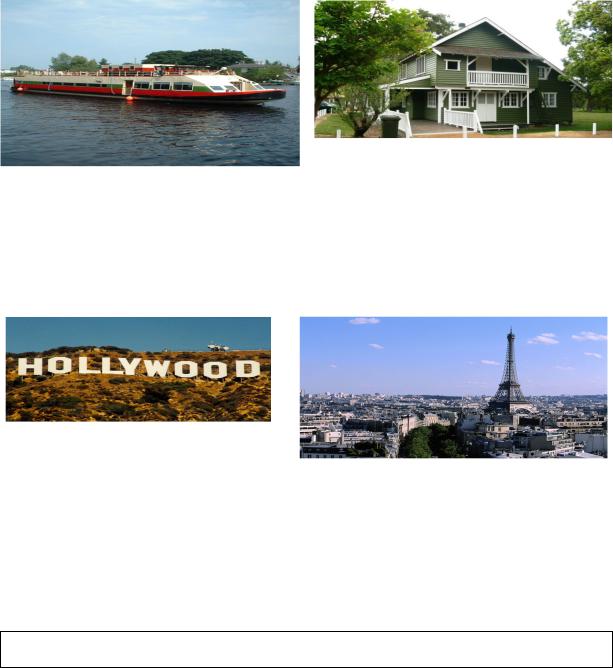
Spend a week on a barge in Amsterdam. Amsterdam has a great nightlife and some of the best restaurants and cafes in the world. Just $300.
Hollywood. Visit Hollywood in the spring! See where all the stars live, and walk on a real movie lot. See the making of a film and have dinner at some of the restaurants that the stars go. For three days live the life of a successful actress on the boulevards where Robert DeNiro walks and works. $500 per person.
Four days in a cottage in the heart of the British countryside. See old English villages, sip tea in a café and experience the peace of country life. Five nights in a bed and breakfast just $250.
Three days in Paris. See the Louvre, the Eiffel tower and the Champs Elysee on this wonderful once-in-a-lifetime sightseeing tour to the capital of France. Two nights in a hotel with half board and a trip on the Eurostar are included in the price. $200 per person.
7. Writing: A formal letter to a holiday company
7a Look through the advert and the letter below. Why did Natasha write the letter?
Spend a day on a boat with your friends! You can have a party or just sip cold drinks on the delightful River Thames. See the wonderful views of Oxfordshire from the water. For more details write to ‘Fishy Boat Hire’ 42 Market Street Henley RG8 2NL, enclosing a stamped addressed envelope.
58

Natasha Morgan
10 Ward Square
London
SE16 4AT
20th April
Fishy Boat Hire
42 Market Street
Henley
RG8 2NL
Dear Sir or Madam
I am writing with reference to your advertisement for boat hire in the Fun-lovers weekly. I am very interested in this kind of trip, and would be grateful if you could send me some more details. I am enclosing a stamped addressed envelope.
I look forward to hearing from you.
Yours faithfully
Natasha Morgan
Natasha Morgan
7b Look at the letter and answer the questions.
1.How many addresses are there on a formal letter and where are they written?
2.Does Natasha know the name of the person she is writing to? How do you know?
3.What else should be enclosed in the envelope with the letter?
7c Formal phrases contain ‘set phrases’. Look at phrases a-f. Match them
to their functions 1-6. |
|
|
a I’d be grateful if you could … |
1 |
You are writing because you saw an advert. |
b Yours faithfully … |
2 |
You want to ask about something. |
c I am writing with reference to |
3 |
You have put something else in the |
your advert … |
envelope. |
|
d I am writing to enquire (about) |
4 |
You are finishing your letter and you know |
e Yours sincerely … |
the person’s name. |
|
f I am enclosing… |
5 |
You are finishing your letter and you used |
|
Dear Sir or Madam. |
|
|
6 |
You want somebody to do something. |
7d Natasha received the price information and a letter from a lady called Mrs Saunders. She decided to book the boat for her friend’s 16th birthday. Complete her letter using some of the phrases above.
59

Natasha Morgan10 Ward Square London SE16 4 AT20th April
Mrs Saunders Fishy boat hire 42 Market Street Henley
RG8 2 NL
Dear Mrs Saunders
Thank you for your letter and the catalogue. I ______________
about booking the boat for my friend’s birthday on 14 June. I ____________ a deposit of &100.
I ___________ let me know what time we would be able to have the boat and when we should bring it back.
I look forward to hearing from you.
_______________
Natasha Morgan
7.e Look at this example from the letter:
I would be grateful if you could send me some more details.
This is a polite way of re-phrasing the question: Can you send me some more details?
We need to change the word order when we introduce a question with expressions like: Could you tell me …
Please let me know …
I would be grateful if you could let me know …
The changes are the same as with reporting questions, and we either repeat the question word or use whether.
60

Rewrite these questions as in the example above.
1.When does the next train leave?
Could you tell me when the next train leaves?
2.Does the train stop at Reading?
Do you know whether the t rain stops at Reading?
3.Have you any rooms available on the 18th?
I would be …
4.Is there anywhere I can get an evening meal?
Could you tell …
5.Is the cottage free in June?
Could you let …
6.How much does it cost to get into the museum?
Do you know …
7.How far is the house from the station?
I would be grateful …
8.When does the last train go?
Do you know …
7d Writing a formal letter
You want to book a room for a dance music evening that you and your friends are organizing. Look at the advert for a possible room. Plan a letter asking if the room will be available for the night you want it. Use the notes to help you.
Room available in large out-of-town building.
Suitable for up to 200 people, wild parties. Easy to get to. For more details, enquire in writing, giving details of why you want to use it to Mrs James, 218 Oxford Street, Chippenham.
Notes
Write the addresses in the correct place.
Think about how to open your letter. Do you know who are you writing to?
Say why you are writing, refer to the advert.
Ask for details to be sent to you.
Close your letter. Do you know the name of the person you are writing to?
61
